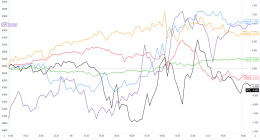
Hawkfish’s experienced political operative Mitch Stewart explains how Hawkfish hopes to make a difference in 2020. The key means of getting to the “fifty-plus-one” count of a winning election, he says, involves getting voters to register, convincing undecideds, and increasing turnout. All depend on contacting the right people with the appropriate message, which is the Hawkfish mission. “Because we have this better raw data set than our competitors do, we’re able to help campaigns make smarter decisions about who they target for voter registration, who they target for persuasion, and then who they target for turnout.”
The reason why Hawkfish’s data set is superior? Bloomberg’s money. “Getting some of these licensing subscriptions to different commercial services is expensive,” says Stewart. “For the most part, the data ecosystem on the left is a bit resource dark and so we’re just able to make some of those investments that others aren’t.”
While every campaign has access to voter files, it is the link to online behavior that matters. “There’s this incredible world of online behavioral signals out there, based on all the things you do on the internet, starting with the basics, like the ads you click on,” says Hammer. “There’s a bunch of behavioral data that you can buy to enrich the voter file.” (Hawkfish says it does not merge those databases into thick dossiers on voters, but serves them anonymously.) Hammer explains that a key part of getting people who tend toward your candidate into the voting booth (or mailing a ballot) is using that behavior to increase commitment. The techniques that Parscale used in 2016 aren’t as effective with voters on the left. For instance, the Trump team was able to identify supporters by those who bought hats and T-shirts. Biden supporters are less likely to go for that. So Hawkfish notices what ads people watch and engage with. If someone watches a Biden ad until the end, that’s a likely supporter, and a target for messages.
The survey guru at Hawkfish is Ellen Konar, who was instrumental in setting up Google’s user feedback processes. “You can buy information, but my part of the organization is in charge of getting better information about the who,” she says. “Right now, it’s about the voters who are either on the bubble or are conflicted.” As an example, she mentions evangelical Christians and people in the military. Both segments have supported Trump, she says, but Trump’s behavior is often in conflict with their values, leaving them open to being convinced by the right messages.
In 2016, when the Trump team identified people who were unlikely to vote for their candidate, it worked on poisoning the well of democracy, promoting content to those voters to sour them on the idea of voting. The Hawkfish people say they aren’t going there. “We have had great discussions about that, and there is agreement that we have to win with our principles intact,” says Konar.
Not that the Trump campaign is quaking in its boots. “I mean they can say whatever they want, right?” Parscale wrote in an email regarding Hawkfish’s claims that it is closing the data gap between Democrats and his operation. “Would love to hear how they did that. Lol.” (Parscale’s note came before he was displaced as campaign manager in light of Trump’s lagging poll numbers.)
Despite offering valuable services at rock-bottom cost, Hawkfish had a slow start in signing clients. “The timing probably works against Hawkfish, in that a lot of these firms were signed up in 2019,” says Mitch Stewart. “During that time, we were busy supporting Mike’s candidacy. And then when that primary ended, a lot of entities already had their vendor picked.”
The nadir came when the Biden campaign chose instead to create its own digital infrastructure using a group of different clients—none of them Hawkfish. Hawkfish had been very public in trying to get that business. A number of accounts, including a report in Axios, indicated that the failure to get the work was in part due to Hawkfish’s connection to Bloomberg’s failed campaign. There were also tensions with the progressive wing of the party which rebelled at handing over critical data operations to a mogul who barely identified as a Democrat. Representative Alexandra Ocasio-Cortez posted a tweet cautioning the Biden team not to hire Hawkfish, which she called “a shady firm w/ a failed track record.” Stefan Smith, Pete Buttigieg’s online engagement director, told the LA Times, “Democrats are rightly suspicious of former Republican billionaires parachuting into the Democratic process working as white knights.” Two experienced Democratic operatives not involved in the decision confirmed to WIRED that such tensions exist.







